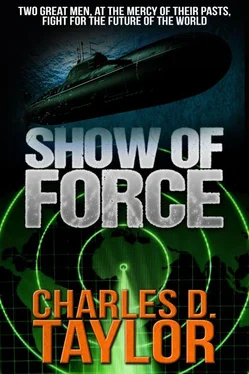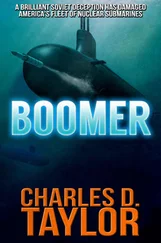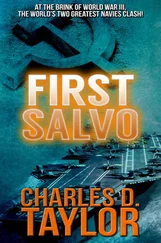"You're right each time, David, my boy, but there has to be a first time for everything. We saddle up at first light tomorrow." He slapped David on the rump. "Come on, we have a bit of organizing to do," he said gleefully. "And by the way, they're even loaning us a little fire support, our very own ASPB, the battleship of the Mekong," he laughed, "to do whatever we want with it, as long as we return it in the same shape as we get it." They were slower, heavily armed boats used for fire support for other small craft, such as the PBR's, and they wallowed along looking very much like the Civil War Monitor. A very hot sun hung high in the afternoon sky. There was almost no breeze in the stifling air, and the helmets and flak jackets were increasingly uncomfortable. The group moved at the speed of the slowest craft, the heavily armed ASPB. Two Swift boats patrolled ahead. They were looking for any sign of the ambushes that the VC favored when they knew the river-boats were on the prowl.
The thick green jungle was set off by the brown water of the river, which moved ever so slowly toward the rich delta, far to the southeast of their little group. The river was a bit narrower upstream, through it would sometimes just as surprisingly open up as they came around a bend. Smaller rivers entered the main stream from under the dense vegetation. But, as some of them had learned in the past, these little rivers were sometimes just estuaries that went back a short distance and ended abruptly with a wire stretched, across to stop unwary boats.
They were now in unfamiliar territory, and David spent much of his time memorizing passing landmarks. This would help a good deal if they found themselves going the other way at high speed. If trouble occurred ahead, they would just have to take their chances.
David had just lifted his binoculars to his eyes to scan the jungle forward and to his left when the river erupted. The sound of the actual explosion came after the mine had detonated. A nearby PER was lifting into the air. Water was hurled up around the craft, but he could still see the bow separate as it began it? descent, almost in slow motion. The .50-caliber in the bow and the sailor manning it went in another direction. The other members of the crew were not to be seen as the remains of the boat settled back to the brown water.
It must have been shallow there to cause so much upward force, he thought. The boat he was riding immediately cut out of the formation to close the wreckage. "Scatter," came the order from Mezey over the' radio, almost at the same time that the boats were independently changing their courses and speeds to confuse enemy gunners. The most important thing was to be one step ahead of the VC, who were likely ready to set off the next mine.
"We have two of the crew, Phil," David called over the radio.
"Don't hang around. There's more than one of those mines in the water if the VC have been doing their homework." And at his last word, another was set off just ahead of one of the forward PBR's, not quite close enough to damage the craft severely. Water cascaded down on the little craft as the wheel was thrown over by a frightened sailor. "Look out for each other," called Mezey instantly on the radio as a boat almost collided with the one that had just missed being sunk.
Another mine exploded, this time twenty yards behind David's boat. Mezey called for speed and the small craft lifted their bows perceptibly as the General Motors geared diesel engines forced the waterjet-powered boats through the water. Another explosion, no mine this time, went off near his boat. David was at the radio instantly, "Mortars," he shouted, "from the starboard bank, I think."
The water came alive with exploding mortar rounds. The air was also filled with machine-gun and rifle fire, all of it from starboard. The boats now were on their own. As they came under fire, each helmsman followed his own nose, paying attention only to where the other boats were. The gunners poured their fire in the direction of the enemy, at the same time trying to avoid hitting each other.
"I'm heading five hundred yards upriver with half the squadron," Mezey called. "You take the others down, and we'll try to get them in a pincer. Get that battleship here as fast as you can. They've got some heavy stuff in there. We're catching bazooka fire." And he began ticking off the numbers of the boats that would stay with him. David didn't need to say anything to his own group. They all heard the order and their numbers at the same time, and they would pick their own way back around the bend.
As they rounded the corner below the ambush area, the ASPB was moving toward them as fast as it could. David gave the hand signal that would turn his boats back. They roared back upriver again at full speed, resuming fire as they came into range of the jungle hideout. Mezey was doing the same from the opposite direction.
They sped into even heavier fire this time, obviously from a large group on shore. They had not seen a human being yet, and had no idea whether or not their return fire was effective. Now that both groups of the squadron had taken the time to settle down, their guns were concentrated into one narrow section of the jungle. The battleship now began to fire its 20-mm. shells into the undergrowth at a rapid rate, cutting out trees where the .50-calibers on the small boats had only been chopping down limbs.
And as suddenly as it started, the water around them was free from explosions and bullets. How long they had been firing with no return they didn't know. "Cease fire, cease fire," came Mezey's voice over the radio. He called out the numbers of two of the boats. "David, you and the rest cover us while we go in to check them out. That seemed to be a company-sized attack with all those weapons. They can't get away that fast."
David watched the shoreline until half a dozen men from the three craft had disappeared into the undergrowth. When he surveyed the group of boats, only one other was inoperable. It had taken a mortar round that had slowed it long enough for a second one to finish it off. The PER was floating on the other side of the river, smoking, the holes in it gradually filling with water. Many of the other boats, including his own, showed the effects of multiple small-arms fire, but they were all effective. Casualties, with the exceptions of the two sunken craft, were relatively light.
It wasn't long before Mezey returned to his boat, moving it out in the water next to David's. "You wouldn't believe it if you saw it. Christ, we chopped up everything in an area the size of a football field and there's not a body in there. We found some blood, so there must have been some hits, but there wasn't a soul there — just vanished." He shook his head, "Everything we've heard about them is true. Hit and run. Hit and run. The little buggers sure know how to scare the hell out of a man, though." He paused for a moment, a finger to his lips. "What's that?" He cupped his ear and turned his head slightly.
David shook his head. He didn't know what to listen for.
"Listen." There were some muted sounds, engines. It was coming from upriver. "That sounds like diesels." He listened again. The sounds were no louder, but it seemed there were more engines. "Son of a bitch! I'll bet they've got boats up there. They were just sent down to see how many we were and scare us away at the same time." He nodded at David. "Let's go. They must have something bigger to hide if they wanted to chase us away that bad."
It was a loose formation, at best, that moved cautiously up the river. Mezey had probably been almost upon them when he feinted upriver before turning back for his attack. There had been a couple of sharp jogs in the river's course at that point. They could have been either farther on or under camouflage at the edge of the bank, but they were certainly gone now. The air was as still as it had been all day, but just a touch of diesel smell lingered.
Читать дальше












